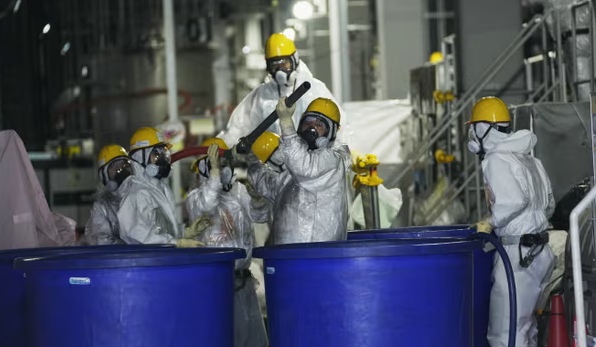Workers at the Fukushima nuclear power plant have been sent to hospital after contaminated water splashed on them.
The incident occurred on Wednesday when four workers were cleaning a pipeline at the Advanced Liquid Processing System. ALPS is a wastewater filtration plant that plays a key role in the treatment of radioactive wastewater accumulated at the plant and its subsequent discharge into the sea. Suddenly, a drainage hose broke during the cleaning process. The workers were splashed with tainted liquid waste, which was not the wastewater flowing within the system.
All four workers were wearing protective masks, and tests showed that none of them had been contaminated with radioactive particles. None shown any health problems, according to the plant’s operator, Tokyo Electric Power Company Holdings, or TEPCO. A fifth worker, who was also doing cleanup work, was away at the time of the accident.
TEPCO began the controversial discharge of wastewater on Aug. 24 from the Fukushima Daiichi nuclear plant, which suffered a triple accident following the 2011 earthquake and tsunami. The sewage discharge, which is expected to continue for decades, has been opposed by fishermen’s groups and neighboring countries, including China, which immediately banned imports of all Japanese seafood.
TEPCO has since completed the first two discharge cycles as planned. Preparations are now underway for the third discharge, which will begin in early November. Junichi Matsumoto, the TEPCO executive in charge of discharging treated wastewater, told reporters that Wednesday’s accident will not affect the discharge plans.
After the accident, two of the four workers were able to flush the contamination down to a level that allowed them to leave the plant. The other two, whose fluid soaked their double-layer protective suits and underwear and failed to sufficiently reduce radiation levels, were taken to a hospital for further decontamination and observation, TEPCO said.
One of those hospitalised, a 20-year-old worker, was found to have radiation exposure to his entire body except his face, while another, a 40-year-old man, was found to have radiation exposure in his abdominal area. The risk that they would suffer skin burns from the radiation is extremely low, TEPCO said, citing the doctor who examined the two workers.
The International Atomic Energy Agency supports Tokyo’s view that the released water is harmless. However, China and Russia have criticised the release and banned imports of Japanese seafood.
The water release, equivalent to 540 Olympic swimming pools, is intended to make way for a much more dangerous task – removing radioactive fuel and debris from the three affected reactors.
